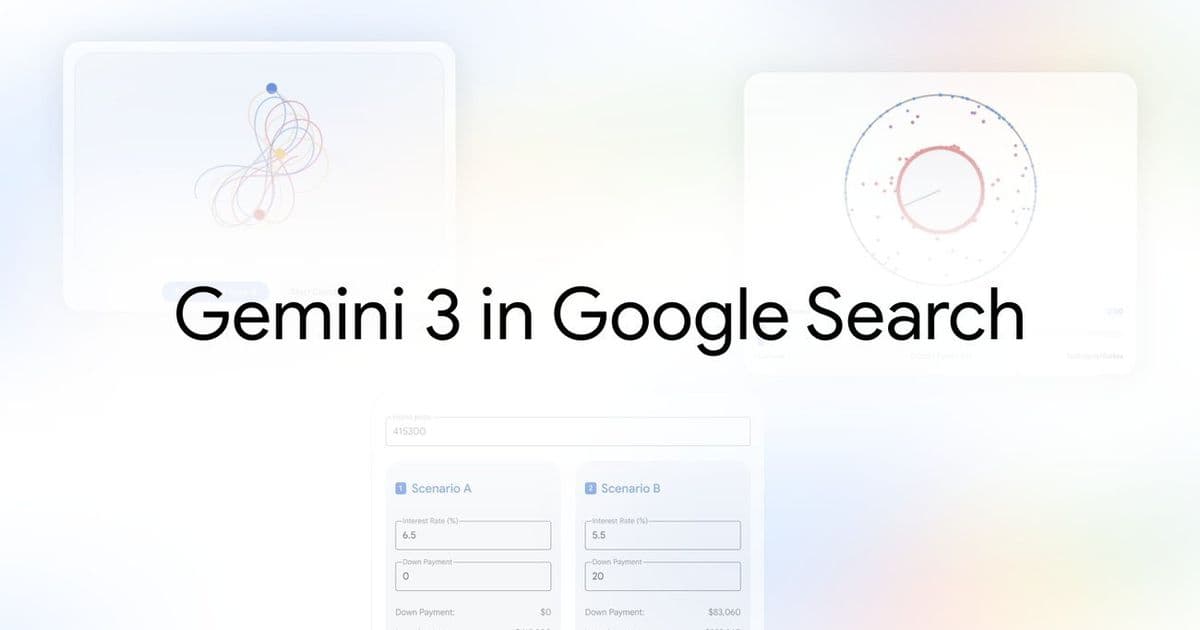Google has integrated Gemini 3, its most advanced model, into Search's AI Mode, delivering superior reasoning for complex queries and pioneering generative UI with interactive simulations. Initially available to Pro and Ultra subscribers, this upgrade enhances query fan-out and automatic model routing, promising more relevant results and dynamic experiences. Developers and users alike stand to benefit from AI that not only answers but actively engages with nuanced intent.
Google Search Evolves with Gemini 3: State-of-the-Art Reasoning Meets Generative UI

On November 18, 2025, Google announced the integration of Gemini 3—hailed as its most intelligent model—directly into Google Search via AI Mode. Elizabeth Hamon Reid, VP of Engineering for Search, detailed how this frontier model's state-of-the-art reasoning, multimodal understanding, and agentic capabilities enable unprecedented depth in handling user queries. For the first time, a Gemini model launches in Search on day one, initially for Google AI Pro and Ultra subscribers in the U.S., with broader rollout planned.
Reasoning Power Transforms Query Resolution
Gemini 3 Pro, the inaugural model in the Gemini 3 family, activates through the "Thinking" option in AI Mode's model selector. Its advanced grasp of query intent and nuance empowers Search to address the toughest questions interactively. A key upgrade targets Google's query fan-out mechanism: Gemini 3 not only executes more sub-searches for relevant web content but also identifies credible sources previously missed due to subtler intent interpretation.
Upcoming enhancements include automatic model selection, where AI Mode and AI Overviews route complex queries to Gemini 3 while faster models handle simpler ones. This begins with Pro and Ultra users, soon extending higher usage limits to all U.S. users. For developers, this demonstrates scalable LLM orchestration, balancing latency and capability in production environments.
Generative UI: Dynamic, Interactive Responses
Gemini 3's multimodal prowess and agentic coding unlock generative user interfaces (UI) tailored to each query. The model analyzes intent to craft optimal layouts with images, tables, grids, and—when beneficial—real-time coded interactive tools or simulations.
Consider exploring the three-body problem in physics: Gemini 3 generates a manipulable simulation visualizing gravitational interactions. For mortgage research, it builds a custom loan calculator comparing options and projecting savings. All responses link prominently to high-quality web sources, blending AI-generated insights with external verification.
"Gemini 3’s state-of-the-art reasoning grasps depth and nuance, and unlocks new generative UI experiences with dynamic visual layouts, interactive tools and simulations tailored specifically for your query."
Elizabeth Hamon Reid, VP of Engineering, Search (Source: Google Blog)
Google's foundational generative UI research supports these features, with iterative improvements driven by user feedback.
Broader Impact on AI-Driven Search and Development
This evolution positions Search as an agentic platform, where AI doesn't just retrieve but reasons, generates, and interacts. For AI/ML engineers, Gemini 3's real-time UI coding hints at paradigms for dynamic web apps and no-code tools, while its query enhancement techniques offer lessons in retrieval-augmented generation (RAG) at web scale.
As competitors like Perplexity and OpenAI's SearchGPT intensify rivalry, Google's day-one deployment underscores its infrastructure edge. Users gain a tool that turns passive searching into active discovery, potentially reshaping how developers integrate search APIs into applications for more intelligent, user-centric experiences.
The promise of Gemini 3 lies in its ability to make frontier AI feel intuitive, inviting a new era where Search anticipates not just what you need, but how you'll best understand it. (Source: Google Blog)

Comments
Please log in or register to join the discussion